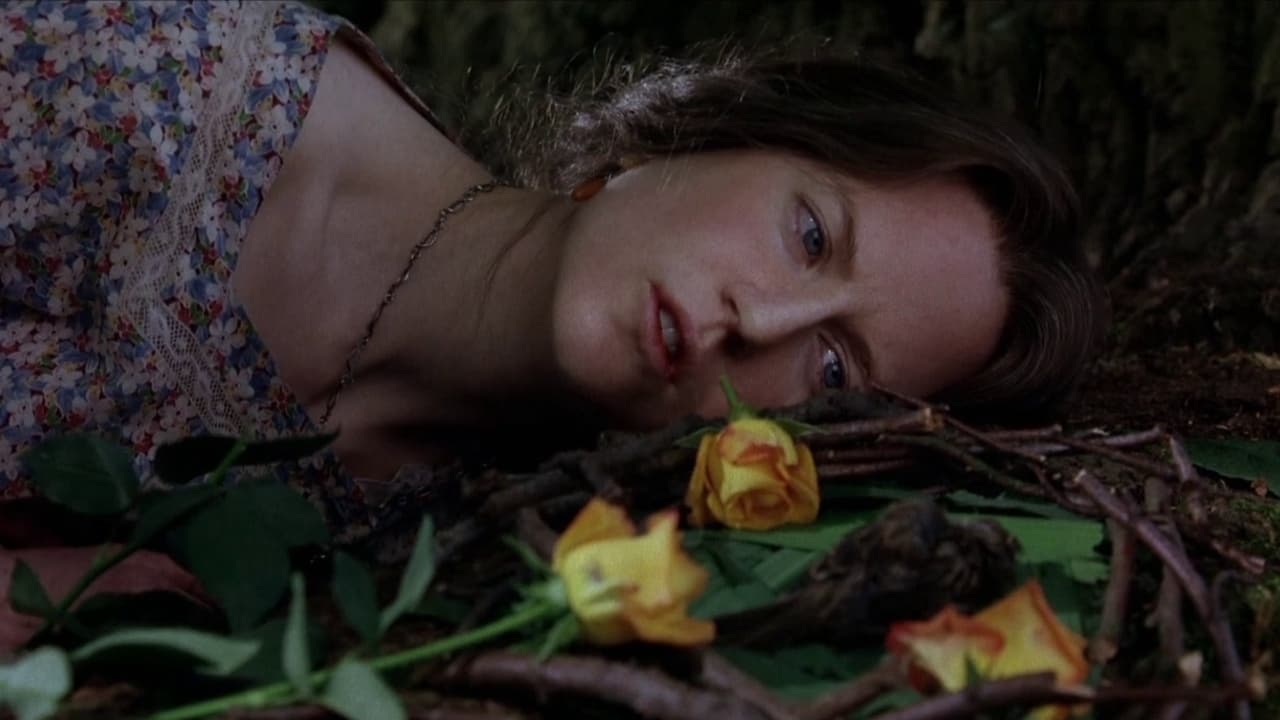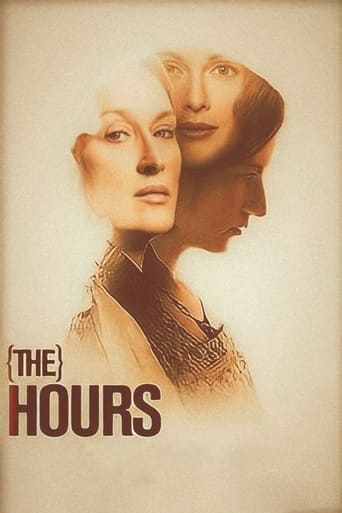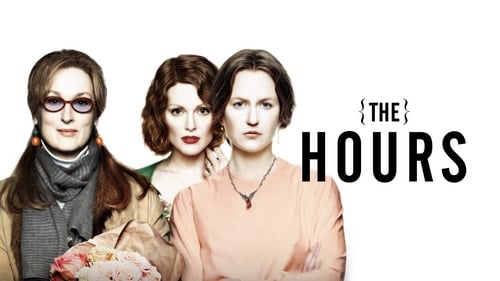



SERIOUSLY. This is what the crap Hollywood still puts out?
View MoreA different way of telling a story
A bit overrated, but still an amazing film
The performances transcend the film's tropes, grounding it in characters that feel more complete than this subgenre often produces.
View MoreI hesitated to watch this movie as it has an all female cast in the main roles, but since Meryl Streep and Nicole Kidman are outstanding actors I gave it a shot. What a huge waste of my time! The only thing I can say that was good about this film was that it was intriguing enough to compel me to view it twice in order to understand what it was all about which was a study of two morose women, who cared for no one but themselves and a third, played by Streep, who was like a flighty bird flitting from being a happy party giver to one who is mourning a lost moment of happiness while still caring for the man she once loved. Amazing that so many viewers saw these self absorbed women as anything but pathetic creatures.
View MoreStephen Daldry's "The Hours" is a quiet and deep movie, of unprecedented narrative, that manage to keep us hooked to the stories of three different women, from different eras, at one pivotal day of their respective lives where they contemplate suicide, not directly for one of them.Nicole Kidman is Virginia Woolf, the famous author and feminist pioneer whose depression and mental vulnerabilities turned her to an acute spokesperson of the ennui the female bourgeois underwent from years of repressed passions and repressed responsibilities. Julianne Moore is Laura Brown, a typical suburban housewife of the 50's who would be the embodiment of marital happiness if deep inside, it wasn't just sheer emptiness. She feels a more genuine connection with a coquette and charming neighbor played by Toni Colette, but there's more than lesbian impulses torturing this heart. Finally, Clarissa Vaughan is a woman of the 21st century; she is bisexual, lives with a woman, has a daughter and helps a long-time friend named Richard, an AIDS-stricken poet played by Ed Harris. He's the most complex male character of the film and that he's agonizing with lucid resignation sort of connects him with the female plights.But "The Hours" doesn't try to deliver a feminist statement or any other message about homosexuality; these elements are accessories to the story but not focal points. The real issue is how a woman can feel totally embedded in her life to the point of suffocation, that these feelings, at the most banal occasions of life, can hit like an electric shock and they can't think of anything that is worth being happy for. But the three parallel lives are not without any connection whatsoever, the common thread is Virginia Woolf's celebrated novel, "Mrs. Dellaway", whose protagonist is an upper-class woman named Clarissa like the namesake Vaughan. Now, I didn't read the book, I only got glimpses of the story-line from the writing process during the Woolf's part, its effect on Laura Brown, and the life of Clarissa who represents a modern "Mrs. Dellaway".That I didn't read the book yet could feel what it was about from these meager but insightful hints says a lot about the remarkable construction of "The Hours". It probably kept the key elements of the book and diluted it into the lives of the three protagonists, the central question being death. Woolf knows that her book must feature one for the value of life can't be grasped if one doesn't die. She's an author and like so, doesn't believe in anything gratuitous happening, there must be a reason. Laura is sick of her life but rather than committing the irreparable act, she surrenders to her weakness, her deep love for her son. But later when she reappears, she mentions the premature death of her husband and her second child, and for some reason, there's not one ounce of grief, or guilt. It could be the passing of time, but the reality is that it was destiny showing her mercy and terminating her hellish boredom while she didn't have the guts to do it by itself.This little help of fate is incarnated by the climactic suicide committed by Richard, an act of despair and generosity toward the woman who dedicated so much time for him instead of thinking for herself. Indeed, all through that fateful day, Clarissa was busy preparing a reception for him, either being disconnected to her girlfriend (Alison Janney) or having a nervous breakdown when one of Richard's former friends, a teacher played by Jeff Daniels, comes to visit. Clarissa seems to live by proxy through that constant preoccupation which Richard mercifully terminated by putting an end to his misery. By that moment, we know he was the son of Laura, who was selfishly left in a house so she could go somewhere . and nowhere, it's like that fateful day instilled something of Woolf's suffering in his life, something that contemplated the passing of time, of hours, with an incapability to find form of happiness. Some kill themselves, some wait for death, some wait for the others to die.There's something of the 'Get busy living' or get busy dying'" in that movie, the idea that not anyone can afford happiness and they must set the example to those who can, it's an act of sacrifice and human generosity. "The Hours" isn't a film for any audience and might easily be deemed as women's movie or artsy intellectual stuff but it says a lot more, that can even appeal to male. Maybe if the film was made today, it would have adopted a militant tonality, but I appreciate that the male characters were rather gentle and understanding people, who couldn't just reach the tortured souls of their wives. There's a failure of communication that men also owe to these years of domination, not that a lot changed in sixty years. When it comes to existential melancholy, some things can't just change.And "The Hours" is served by impeccable performances from Nicole Kidman, unrecognizable as Virginia Woolf, to the poignant vulnerability of Julianne Moore. Streep was nominated for "Adaptation." that year, but I don't know if she would have been nominated for "The Hours" anyway, she was good, but she played her usual vulnerable self, and it's so common from a 2000's standpoint that it surprises less than Kidman and Julianne who still had to hide being the façade of conveniences, they had it harder.And it's not a coincidence that Clarissa was the only one not to contemplate suicide.That might be the light of hope, maybe the ending is a happy now, at least, in the scale of unhappiness that forged women's lives all these years?
View MoreIt is not exactly a good film. or a masterpiece. or the perfect choice for Oscar. it is not only a remarkable adaptation. because the acting transforms all. the novel, the expectations, the respiration of Michael Cunningham lines, the rhythm, the details. three great actresses are masters of a subtle, impressive, complex transformation of a story who becomes almost magic. axis - a character who guides the life of each movement, who propose new manners to understand the life, who becomes a kind of spirit who has as guest each of the women looking her form of happiness. The Hours remains a revelation at each new view. and that fact is not surprising because it is more than an extraordinary film but a sort of mirror for his public. a film of delicate nuances. and one of refuges for rediscover the meanings of life.
View MoreThis is an excellent example of how the great and authentic adaptation of a famous novel should look like. The film consists of three different but firmly connected stories.In the first story Virginia Woolf is a sick writer in the 19 century and her husband sustains her. She is writing the novel "Mrs. Dalloway" about a woman that has completely different life and is the one who sustains a male sick writer. One day in life of Mrs. Dalloway, exactly as it is depicted in the novel, is presented in the third story of the film, which is set in the 21 century. Clarissa Vaughan is giving her best to organize a party for her ill friend Richard, but he is depressive and understands he is the obstacle for the happiness of Clarissa. He knows that from the experience of his mother (Larisa Brown), so he decides to go and let his dear friend live. Virginia, from the first story, knows that, too. She realizes that fact while composing the novel and is aware she is the one that has to go.In the second story set in 1950s, there is a portrayal of a woman, Larisa Brown, who struggles to find her own path in the society full of social stigmas (especially concerning women). She is reading the novel "Mrs. Dalloway" which she sees as the possible solution for her life. She is unstable and frustrated, always trying to have some sort of control in the situations in which it seems she has no control at all. Her friend and neighbor is completely different character, but also has her own struggles in men dominated world and wants to at least have an illusion of control. 'I want to drive the car myself', are her words that illustrate the point. That stigma of Laura's family life has to die, or else she has to die. She chooses to live and abandons her family for good.
View More